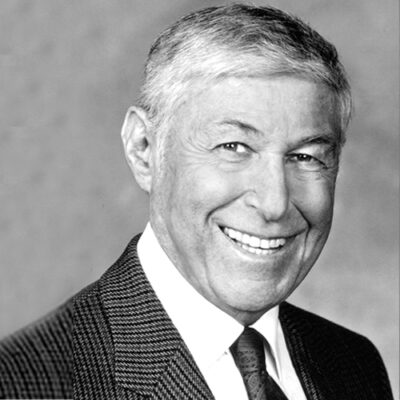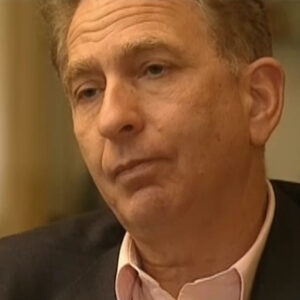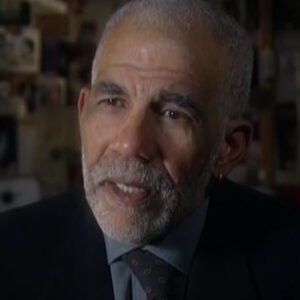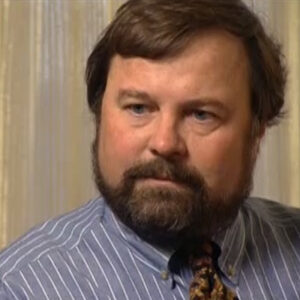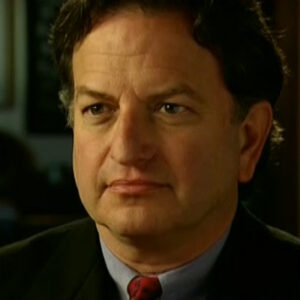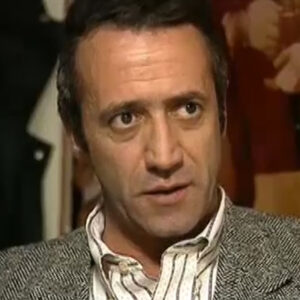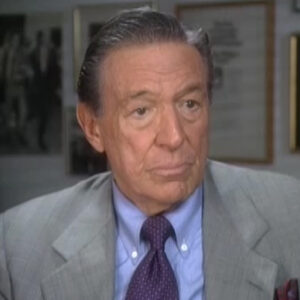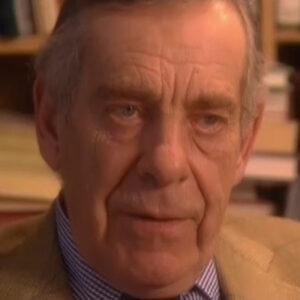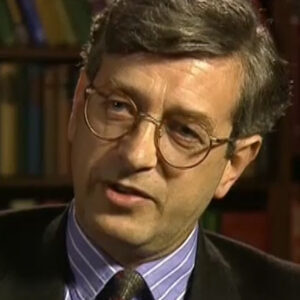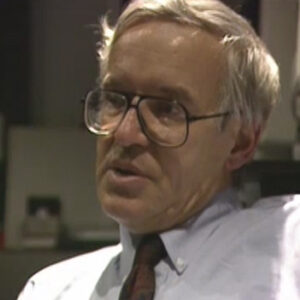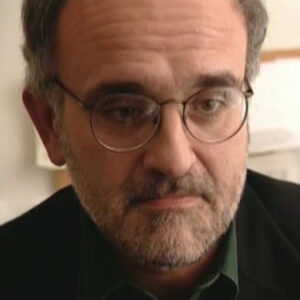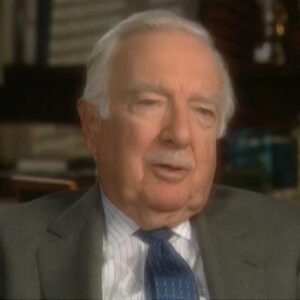Speaker We’re going to start a pretty rudimentary here, which we have done sort of little bios on everyone. Now you’re a fairly well-known bio at this point in time, but in a very short way.
Speaker If you could just tell us your name and a little bit about your background before you came to 60 Minutes, I talking to 60 Minutes. Yes, OK. OK, I know it’s so. So trust me, I’m doing this for the photo.
Speaker Bob Simon, I when I got out of college, I had no idea what I wanted to do. So I went to France for a couple of years on a Fulbright.
Speaker I had a wonderful time. Then came back.
Speaker I always thought I was going to be a professor. I thought academia was for me. So I came back from France and started doing graduate work. And lasted about six weeks. I just couldn’t stand being locked up in the library after having to spend two years roaming around Europe. This was the middle of the Vietnam War. And I couldn’t just go off and try different things because I’d get drafted and the one my one priority was not to go to Vietnam. So I joined the Foreign Service. And I realized after six weeks that this was we were not meant for each other. But I had to stay in it for a while. And I ended up with a job at the United States mission to the United Nations in New York, I was a diplomat working in the political section of the U.S. mission to the U.N.. And it was actually quite interesting.
Speaker And one of the fringe benefits was I knew stuff, so I was a source and journalists were calling me and taking me to lunch at expensive restaurants, and then I told them everything I knew.
Speaker And then when I decided when my twenty sixth birthday was approaching, I think this journalism looks like fun. Um, I, uh, I called them all these people who I’ve been having lunch with and said, can you get me, uh.
Speaker An interview, and they were all very helpful and it was a lot easier than just knocking on the door of a personnel office. And in fact, my favorite story was I got in to see Abe Rosenthal, I got right into his office, managing editor of The New York Times at the time. And we we just chatted for a for a while. After which he said, you seem like a very nice young man, I hope you don’t expect me to offer you a job, is it? Well, I had entered my mind then. I kid you don’t start at The New York Times. And the only offer I had after the smoke had cleared was an offer from the Honolulu Star Bulletin. And I was actually about to get on a boat and go to Honolulu when I was offered a job as a writer at CBS News.
Speaker And I went in and in fact, I had to audition, I had to just rip off wire copy and write some stories and I did, and they were happy. And I was so buoyed up by that that I just walked down the hall into the office of Gordon Manning, who was then the big cheese Dacron from at CBS News, the executive vice president, I walked into his office and said, I’ve been trying to call you and you haven’t returned my calls. And I just got off of the job from Channel two. But I’d like to work for the network. And he said, you’re on. So I got a job, I was carrying coffee, I was on the assignment desk at the CVS. This was in nineteen sixty seven. And I spent the last six years trying to avoid Vietnam, so, of course, one of the first things he did was sent me to Vietnam and I spent I spent over a year in Vietnam, and then I just sort of stayed a foreign correspondent. And I worked out of London for seven years and I went to Israel. And the one mistake I made was I’d never been a careerist, I was just sort of in fact, after Vietnam, careerists were saying to me, hey, you know, you’re hot. You just covered a big story and you did it. Well, go back to the states. I’m sure you’ll be a White House correspondent. And I just didn’t want that. I wanted to go back to London. And the few years I spent in the States, which was 15 years ago, it didn’t do much for me. So I went back overseas and I’ve been overseas since.
Speaker Amazing. So you actually learned the skill and the trade of being a journalist at CBS?
Speaker I’ve never been anywhere else.
Speaker Interesting, um, I didn’t know that actually you were profiled in a 60 Minutes story back in March of 1991, free at last, Ed Bradley did the story. You had just been released, brought back. Can you talk to me about the events surrounding it and what it was like to be on the other side?
Speaker Well, it’s really interesting you bring that up, because I wouldn’t have a few weeks ago, but a few weeks ago, I was sick. I had the flu for four a week. And I was at home in Israel and just sort of looking for things to do, so one of the things I knew needed to be done, I had just stacks of videotapes all over the place, disorganized, unlabeled. I just didn’t know what was Whiteside’s if I’m going to sort this out. And I just took all these unlabeled tapes and stuck them into the machine and saw what they were, and I ended up looking at free at last for the first time, I’d never seen it.
Speaker And it freaked me out. But watching it, I had no idea I had no idea how wired I was totally out of control I was.
Speaker Had you not watched before that for any reason?
Speaker I guess I was afraid to I guess maybe I sensed.
Speaker Uh, that, um.
Speaker I wouldn’t want to see myself, and it wasn’t the physical appearance, it wasn’t the beard and the and the skinniness that that bothered me was it was the.
Speaker Look, I imagine it’s a fairly banal explanation that like most people who work on television for a living. I like to be in some control of what I’m doing, and I guess I sense there that I was totally out of control. And it bothered me telling me what I found remarkable was that my my good friend Peter Bluff, who’s British and who went through everything I went through, he was his British self in that in that 60 Minutes, he was laid back and very sardonic and understated.
Speaker And I was just all over the place.
Speaker I didn’t see was all over the place, I saw you as very vulnerable.
Speaker Well, I don’t think I realized it at the time. I know how much you want to talk about this, but I had a fascinating chat with Terry Anderson in Vietnam.
Speaker I ran into him in Vietnam while doing anniversary piece of the 20th anniversary of the end of the war a couple of years ago. And it was the first time that Terry and I ever sat down and.
Speaker And talked about stuff. And he told me how he was handled. When he was released. And the first thing that happened was he was flown to this Boston. And before they even let him see his wife and his kid, two psychiatrists sat down with them and said to him, You feel great, you’re feeling free and wonderful and. And exhilarated and ecstatic. And you’re not. You are fragile. And incredibly vulnerable.
Speaker And we have to take care of you or else your break and the way we’re going to take care of you is we’re going to take you and your wife and your kid to an island in the middle of nowhere. And there’ll be no phones, you know, faxes. There’ll be nothing.
Speaker And we’re going to take it step by step, nobody said that to me and I was feeling great and therefore I thought I was I thought it was a genuine feeling. And I was sitting in this hospital bed in London working the phones, and I was getting all these calls from lecture agents and Hollywood people and literary agents. And I was by the time I got out of the hospital, I’d committed myself to a book and a TV series and this and that.
Speaker And it took about two weeks for me to crash. And when I crashed, it was it was a pretty hard landing.
Speaker Did you have any? Thoughts or desires or. Ambitions at that time to be part of 60 Minutes as a correspondent.
Speaker I’ll tell you. I mean. Any I think any correspondent at CBS News, if not any network, who would tell you that 60 Minutes had never entered their mind, don’t ask any further questions because they’re lying. But during that interview, Ed Bradley took me for a stroll around the hospital corridor and said, there’s an opening at 60 Minutes and you’re one of the people being considered for it. Oh, really? Yeah. And I got very nervous when I heard that. Huh. And a couple of weeks later, Eric Ober, who was then the president of CBS News, called me at home in Israel.
Speaker And said, I want you to know that Lesley Stahl is going to be joining 60 Minutes, I just want you to know that you were very seriously considered. And I said, Eric, I always thought I could be honest with you, you just I feel very, very relieved because at the time when I was beginning to realize how fragile I was, I was not in the mood for a new challenge I did not want to go into.
Speaker Something new.
Speaker What I wanted and Derek was a prince when I was in the hospital in London, he said, Bob, anything you want, you want to go to New York, you want Paris, you want you want anything, you’ve got it. Just tell me which one said all I want to do is go home to Israel with my home was that still is now. And that’s all I wanted. I wanted the familiar and the comfortable. I did not want anything new. So it worked out well. Oh, yeah, know, I think it’s the way it’s worked out for me is the timing has been perfect and the circumstances have been perfect. It’s something that’s just fallen very, very comfortably for me.
Speaker I guess I was sort of wondering about and I don’t know how much appropriate this is, but it’s sort of hard to not ask this question. But how much your being in captivity affected you as a reporter?
Speaker I don’t think very much, except in some very particular ways, I mean very specific ways.
Speaker I.
Speaker Find that I relate very sympathetically to prisoners no matter what they’re in prison for. Really had you not before. No, I mean, not in that general sense. No, no. But I find out that anyone who’s who’s a prisoner for whatever reason. I have my my heart jumps out to him.
Speaker It’s understandable.
Speaker And the other ways.
Speaker Well, you said something in free at last June, you said, and I’m sure you know exactly what I’m referring to right now, you you said in the program. I don’t know, I would be able to face a war situation the same way I had before with a certain kind of naiveté about what could happen. And I guess that’s what I was sort of referring to.
Speaker It’s interesting, I guess, about you. Just about a year after I got out, the war began in Bosnia. And David Greene, a great cameraman. And I were among the first people in among the first journalists, and we managed to get two seats on the French military transport that was flying into Sarajevo. So we were there.
Speaker And I think it was perhaps a little more cautious, but what was really interesting was that long after it was all over, after we were out of Sarajevo, David said to me that the CBS brass had said to him, keep an eye on Simon, see if he can still do it, you know, and just be and if he can’t get them out of there right away.
Speaker You know, I’m not sure, but maybe, you know, do you know of the that Don Hewitt has a sort of very romantic idea of the foreign correspondent, the man in the trench coat?
Speaker Trench coat, a trench coat, do it for him.
Speaker It does, absolutely the trench coat. Front page. You know, the foreign correspondent, has he never spoken to you about it? No, he hasn’t.
Speaker And I know I didn’t have that impression. I know that Don Hewitt has an enormous respect for four good reporters. I didn’t know there was a particular thing about foreign correspondents know the romance of one.
Speaker I mean, the the Hollywood version of the foreign correspondents. He knows better than that. Well, I was going to ask you about that, but I guess I guess he hasn’t had that conversation with you. Know, he wouldn’t I.
Speaker I guess the reality in the the fantasy might not exactly match up.
Speaker In fact, I ran into him in the corridor a couple of days ago. He said that was a great winning piece. I loved it. And, you know you know me. I’m usually don’t say nice things.
Speaker So if you felt that about foreign correspondents, I’d be the last one to tell it to to contact you after frailest.
Speaker After you got back, after you were released, I mean, what was your first contact with you? Let me just back up here in.
Speaker Well, I mean, over the years, I had spoken to him now and then, he, you know, he asked me to do things for him now and then look into a story or or do an interview for him. And he was, you know, always, you know. Very gracious, I’m. I think the first story I did. For 60 Minutes was a story out of out of Lebanon, if I’m not mistaken. So I think that was the first contact I had with him on a story. What was it like? It was. It was mind blowing.
Speaker In what way?
Speaker Because. It was a story on Hezbollah. And we put together I mean, I have been doing this for some time reporting and usually short form, but some long form, though not for 60 Minutes, and I put together a story for one Hezbollah, and it was perfectly coherent as far as I was concerned.
Speaker And after we satellited it to him, he called me and said, now, look, when we have to do is what what’s your part three has to be part one and what your part two has to be part for. And you stick that paragraph there, you know.
Speaker What’s going on here? And I said, let me call you back, and then I did it and he said, you wanted me to open with a up, which I’d never, ever done to open a piece with a standup. It’s crazy. Why? Because you want to open with with starting to tell the story and the the atmosphere in some. And something something more interesting than the McGee standing on camera, you know. But I so I rearranged it, stuck it, in my word, perfect, and he asked me to do it and print it out and. Yeah, and it works, and I think it’s much more dramatic this way. He’s right. Yeah.
Speaker I guess you got the 60 minute handshake.
Speaker The 60 Minutes, I’ve never heard that before, that time just came out of my mouth.
Speaker He said he liked the piece, but every piece I’ve ever satellited to to Don, it’s I think pretty much every time has been exactly the same reaction. Which has been, Bob, this is going to be great, oh, we have to do is change this and this and this. You know, he always he’s always it’s always very positive and always great story, let’s just make these changes.
Speaker He’s amazing, amazing script, Doctor Haeju and doing CBS News, do other head, anyone else ever done this to your material before?
Speaker No, I mean, yes, I mean, back when I was learning. Sure. But recently, no. And it’s been. It’s been actually wonderful. Because it’s really nice to learn. Look. When? Some guys 20 years younger than I am. Show me new tricks you can play with video tape machines. I’m learning something. But OK. What Don does.
Speaker He wants you to tell the story, just tell me the story, I don’t want history, I don’t want background. I don’t want parentheses. I don’t want footnotes. Just tell me the story. And this is something I thought I knew how to do. And I was wrong. Because he is teaching me how to do it better. So he’s teaching me how to do something better that had always been if I have a specialty. I mean, this is what I’ve been doing for 30 years as telling stories. But what happens is, no matter what story you’re telling, particularly, I think. For 60 Minutes, more than four hard news, because for a 60 Minutes story, you’re spending more time on it. It’s longer and it’s more involved. Therefore, you get closer to it. And whenever you get that close to something, you tend to lose sight of the big picture and Don just brings you right back. Hey, I don’t need to know this stuff. This story has a beginning, a middle and an end. But you’re sort of lost me somewhere. You know, somewhere in the middle, you got stuck in a swamp. And frankly, this is very painful to say, but every time he’s been right.
Speaker You know, it’s interesting because a lot of people talk about a form of 60 Minutes and that part of the form is that there must be a person who becomes the spokesperson for the story, which I think is that a big difference between reporting for CBS News and 60 Minutes?
Speaker It’s one of the differences. Maybe give feedback to me so I don’t have my question. Thank you.
Speaker If you go off and shoot a story not only for hard news, but for any other broadcast at CBS. And you find that the characters aren’t quite what you thought they were and the situation isn’t quite what you thought it was. You can sit down at a typewriter and write your way out of it. You can’t do that on 60 Minutes. You need a character, and if the character lets you down, you know where. All you need is one. I mean, if you hope for two and one lets you down, but you have one left, I find that you’re OK. And I’m not speaking from vast experience. And I’ve done like, what, eight or nine stories so far. If it’s not there and one story I did just didn’t work out because the characters wasn’t there was a good story. I mean, the storyline was clean. I wasn’t it was a story in Israel. It was a story about. Families of victims of terrorism, mainly parents of kids who’ve been killed in terrorist attacks, who decided that the. Knee jerk Israeli response to terror, which is let’s go to the right that’s become hard line, let’s say screw the Palestinians was wrong and it would get them nowhere. So these parents of dead children. Got together to form a lobby for peace.
Speaker And it’s a good story, a good story. That’s right. The characters didn’t work out. The characters just didn’t work out. And it’s a piece that never saw the light of day after Don said he didn’t like it, I I recut it and gave it to Sunday morning and for a Sunday morning program. It was terrific, which is not that their standards are lower. It said it’s a different kind of broadcast. It was soft.
Speaker Was the kind of thing. Was it one of those screens where Don said, I can’t fix it?
Speaker There was never even a screaming. We were doing it in Israel and we satellited him chunks of it.
Speaker No, in fact, it was we satellited him a rough cut from Israel.
Speaker And Don said. Forget it. And the producer said, well, you know, we can change it, we can dance it, forget it, it’s not there. I don’t want to put you through it. It’s not there. I mean. I went out to my favorite bar.
Speaker I was devastated. I was in terrible shape. I was so stricken. And then we we we cut it and gave it to Sunday morning, and they were delighted again, not because they have lower standards, but because that kind of it just wasn’t hard hitting enough.
Speaker I want to. I miss something. We’ll talk about the suicide bomber in a second, but I was sorry that I couldn’t be shooting the entire time because I understand that after we filmed you, you had to finally finish it very quickly to get on the air and sun.
Speaker And I guess you flew to London to do your stand up or you did something by satellite, right?
Speaker Well, we we we certainly did it from Israel. And I went to London.
Speaker But when you did your stand up. You did the book? Yeah, Don director.
Speaker We did it in Israel for the first time, we we got a studio in Israel that managed to do the book on Yom Kippur. No, it was not.
Speaker It started again because I remember there was some problem with Yom Kippur or Rosh Hashanah was right around there. And you were having there are some I think we had to do it quickly because the holiday was coming up.
Speaker Yeah, but we did it from a studio in in Israel. Let me just start again, because I interrupted you. We did. We did the book for the first time ever. Books are done either in New York or in London, and we didn’t have time to do that. So we booked a studio in Israel and Don said, fine, let’s see what it looks like and apparently it looked OK. So we did the book from from Tel Aviv and Don was watching it as it came in here.
Speaker But did you even direct you that I got the impression that he that he kind of when you were doing your standup, that he was actually directing you and telling you to not speak.
Speaker So after you do what, he does that all the time. Oh, tell me about that. I mean, Don done any and he’s reasonably gentle about it. He says, you know, you’ve been on the road all these years. You’ve been in the field all these years. When you’re doing a studio piece, it’s not the same as doing a stand up in the middle of some war zone. Somewhere you speak softly, very low. You just it’s a chat. It’s a conversation. Odon has given me a lot of grief, not only on studio pieces, but on my delivery. Because. It’s entirely different when I’m doing a piece for the evening news. Let’s face it, an evening news piece is rarely more than two minutes and 15 seconds. And usually we’re doing good stories, which means that there’s a lot I want to say. So what I end up doing is writing a three minute script and script and speaking so fast that I can squeeze it into two 15. So I tend to have a very fast delivery. And also a little bit singsongy, which is something I wasn’t aware of until Don pointed it out. And he’s just been very I mean, relentless on slow down. Soften up, just talk to me, which is part of the it’s not just a cosmetic thing, it’s part of the syndrome. Tell me a story. Don’t shout at me. Don’t give me this rapid fire narration. I don’t want to hear narration. Just talk to me. And what he said to me that helped to help me to do this, he said. When you do a stand up, it’s fine, you’re talking to me, and then when you’re sitting in a recording booth and do a narration, it’s terrible. Just, you know, look at you stand up, listen to your stand ups and try to do it like that. And then another trick, which I never would have said, stick your finger in your ear and it’ll it’ll sound different to you and it’ll sound you’ll. Naturally just not shout so much and apparently it helps.
Speaker Interesting, but an interesting thought. Where do you come up with that?
Speaker Where did he come up with that? You’re asking me. I don’t know where he comes up with this stuff, but it works.
Speaker Had you heard about all Don’s television inventions?
Speaker All dynes television inventions? No, I heard that he invented television news.
Speaker Let’s talk about the suicide bomber. Can you set up the story for us? I what I do understand is that this was something that Don very much wanted to do.
Speaker That’s right. And Michael Gershon and I were to say it from the beginning, so I don’t have to.
Speaker OK. How did you happen to do the story in the suicide bomber?
Speaker Suicide bomber? Michael Gershon and I were in Israel. In fact, we were about to go off and do another story somewhere else. And we got a call from Don and said, hey, do a suicide bomber story. And Michael and I looked at each other and did a visual groan because it was neither one of us were enthusiastic about the story at all.
Speaker The reason being, I think we both felt it had been done that way. There was a limit beyond which you couldn’t get because you can’t get to the kid who’s going to blow himself up. And if you did, miraculously managed to get to him and he went and blow himself up and killed a bunch of Israelis, it’s a story you don’t want to get to. And I had done suicide bombers stories dozens of times. The evening news. So neither of us were at all enthusiastic about it. I also felt that we wouldn’t be able to get the kind of access you’d need to do it properly. But Don wanted us to have a go, so we had to go. And I was surprised, and it’s something else I learned about 60 Minutes, when you call up pretty much anyone in this case, it was the Israeli government and say, we want to interview this guy in jail, that guy in jail, that guy in jail, when you call him up and say you’re doing it for the CBS Evening News, they might be a little more reticent. But there’s this phrase, 60 Minutes that has magic evening news everywhere.
Speaker Really? Oh, yeah.
Speaker Sir, sir, everyone in Israel knows knows about 60 Minutes and they know that they also know that when you tell them, because from experience, the Israelis know that when you tell them you’re going to do a story, you’re going to do it whether or not they cooperate. So if they cooperate, they know that they can get their view across up to a point. At least their view will be heard. And in fact, they they like the idea of doing a suicide bomber story. And they were very cooperative. I don’t know if they were very happy with the story, the way it turned out. What did they think they would gain from it?
Speaker I think that what they would gain from it would be all the viewers of 60 Minutes seeing what monsters the terrorists are. How everything Israel does in its anti-terrorism policy is just. And I think they felt it would hurt the terrorist organizations.
Speaker I think part of that worked out the way they thought part of it probably did not. But Michael and I, as we were shooting the story. Kept on laughing because we looked at each other after we were after we’d come out of interviews that were frankly mind blowing and we have both been around that block before, sort of blow our minds on this level was something we’d walk out of interviews shattered. And think, Jesus Christ, we didn’t want to do this story. He would have to force us into doing the story. You know, that says a lot that we’d rather not listen to, but it was a very shattering experience shooting that story. And again, we don’t get shattered every day.
Speaker Tom, fill me in on the what particularly was shattering. What was different about what enlightened you in a way that you some of the season did you were surprised by?
Speaker What was shattering was talking to these guys in prison, one guy in particular, Hassan Salame, I knew his name. He’s one of the most famous terrorists in prison anywhere. Hassan Salameh is the Hamas activist activist who engineered the bus bombings. Last spring in Jerusalem and Ashkelon, in which dozens of Israelis died, he was the brains behind the bombings. It was Hassan Salameh who’s found these young, vulnerable, confused kids and convinced them to blow themselves up. So I was anticipating I know Michael was also anticipating to meet a monster. Certainly to meet a fanatic, a man who we would sit with and, you know, who talk to us about paradise and. Virgins in paradise, which is the cliche as to why these guys blow themselves up so that they each get, I think, 72 virgins in paradise. That’s not a bad deal if you believe it. And I think we were expecting in shorthand a monstrous foreigner, somebody who we could not relate to at all. And what we found was a. Somebody who I’d met many times before. I met another committed insurgent, I’ve met him in Vietnam, I’ve met him in Algeria, I’ve met him in Northern Ireland, somebody totally devoted to a course, very smart, willing to give up his life for the cause. In this case, the cause was had something to do with Islam. But frankly, sitting with him, I found that to be of limited relevance. It could have had to do with national liberation, as it did in Vietnam or in Algeria or a modified version of that in Northern Ireland. I was sitting down with an insurgent personality and a guy who was very dedicated, totally committed.
Speaker And it was just one more example in the lesson which we should have all learned by now, that if you take a people and screw them over badly enough, the strongest of them are going to rise. I am not defending what he did. Bombing civilians is a horrible thing. And in fact, he was, I think, very candid in his answers to my question. But when I asked him, because he wasn’t caught for several months after these suicide bombings, why? When I asked him when you saw the television pictures.
Speaker Of what your mission accomplished of the dead and mangled bodies, the kids, the women, when you saw those pictures, how did you react? And he said. I’m not going to answer that question.
Speaker But we walked out of that, you know, just it wasn’t what we’d expected and it’s it’s again, it’s part of the of another lesson, which is whenever you demonize any people in any general way and you get to know them well, whether you like them or not, whether you approve of what they’re doing, whether you condemn them or not, they’re not demons. This guy was no demon.
Speaker To Don tell you about the phone call he received that he had with the letters that he got in response to the program. Now, we had an interesting phone call, but I’ll tell you about later. Did you I was interested the way Michael talked about how the circumstances of physically how you did the interview, where he had been before. Can you just fill me in about the way he came in shackles? I mean, he was taken from solitary confinement. I, as an outsider to your profession, found it rather fascinating about how you have an interview with someone in those circumstances when you don’t share a language, when they’re you know, they’re basically had been in solitary confinement, they’re still in shackles. They’re you know, how do you how do you create that rapport that seem to come across that you had with them? How do you get him to trust you? I mean, do you know what I’m asking?
Speaker The Israelis agree to let us interview Hassan Salameh. But since Israel is, after all, a democracy, interestingly enough, they said you may interview him as long as he agrees to talk to you. Now, again, interestingly enough, there were also prisoners in Yasser Arafat’s jails who we wanted to interview. And Arafat’s guys said, OK, you may interview them. There was never any question as to whether or not they would agree to talk to us. And in fact, we got very bad news. Hassan Salameh was central to our story without Hassan Salameh. We didn’t have a story. And we got word from the prison authority that they told Hassan Salameh we wanted to talk to him and he wasn’t interested.
Speaker No desire to talk to anyone from the Western media.
Speaker So we went to the prison, Michael and I, only the crew stayed out in the van and we. Just as the prison people to let us chat with Salame with a translator, I presume we had a Palestinian with us because one of our guys is not one of the prison guys. And they let us into this tiny little courtyard wall surrounded by high walls where he got his whatever it is, our everyday exercise, and he was shackled in the courtyard and we sat with him and.
Speaker Just talk to him.
Speaker That’s all we did, we just talked to him through the interpreter, but I think that what was said was perhaps less important than the eye contact, and I didn’t feel like I was conning him. I mean, we do con people now with it, but I didn’t feel like I was calling him. We said to him that. You are demonized everywhere in the world, particularly in the United States, mentioned Hamas and the Association of any American who’s heard of Hamas as terrorist. Do you think you’re a terrorist?
Speaker Shouldn’t a terrorist? Well, you know.
Speaker We’re giving you a chance to state your views, to get your point across, to explain why you do what you do, because what you do is monstrous. But this is what we’re here for, we’re not Israeli TV, the Israelis will not censor our report. It’s going to be shown to an awful lot of people in America and in a lot of other countries. And this is your chance to to do it. And he thought about it and then he agreed. And, you know, crew set up in room very much, not very much like this. It was in just a noisy room in the prison where I think that the prison administration had meetings sometimes and he was brought in shackled, which is quite a sight. I know about these things. And then we just sat and talked. And I think he became increasingly at ease. And I think he.
Speaker I think he really got into it may maybe too personal question to ask, but did he know about your experience of being a prisoner?
Speaker I’m not sure it’s it’s fairly widely known story in the Middle East because it happened there and it got a lot of play there. I’m not sure if he knew or not.
Speaker I was thinking. But you said how there’s a kind of understanding, a certain kind of.
Speaker I think in the course of when we were chatting, when we were shooting cutaways, I remember talking about it that.
Speaker It was a chilling interview, and I think the Don was beyond ecstatic, I mean, he was well, what did he say to you when you saw the story?
Speaker So the same thing he says, I think this is going to be great. There are a couple of things we have to change.
Speaker I don’t think that I don’t think actually that we had to change very much there because it was. It was. It told a story, and that’s what Don wants done, we had the story not only of this guy, but it was a story with a beginning, a middle and an end. It was a story about this guy who went off on a mission and he described how the mission went and new elements and new characters kept coming into it. And then it had a conclusion, which was a very bloody conclusion.
Speaker It also well, it also hooks into another another, Don. You would assume that the strongest thing that you can put on television is an interesting talking head.
Speaker Yes. Which goes against the conventional wisdom of news broadcasts, because I remember more and more over the years, talking heads have become anathema. If all you can give us are talking heads, don’t bother. And perhaps in hard news, that’s true because you don’t have the time to really look into a guy’s eyes and figure out who he is. Whereas on 60 Minutes you have that time and there’s nothing else at. What is interesting is people.
Speaker How long the interview did you have with him or. We were sitting together for a couple of hours and hard news when you do an interview. So how long are you sitting with him?
Speaker Sometimes. In fact, you sit with him just as long if you’re if you’re that interested.
Speaker But all you’re going to get on the air is maybe a couple of 15 second soundbites. Yeah. What’s the difference?
Speaker Isn’t very interesting. Was it difficult or how did you convince his mother and family to talk to you?
Speaker Well, it wasn’t Hassan Salome’s mother and family. We convinced the mother and father of the boy who blew himself up, and that wasn’t difficult at all. I mean, some people are hard to convince and others are not. No, they were very happy to talk about their.
Speaker So what has happened to sell me since you do?
Speaker I don’t think anything has happened. But it was really interesting for me because shortly after we interviewed him, the Mossad botched an operation in Yemen. And as a result of that, the Israelis were obliged in order to placate King Hussein to release a whole bunch of Hamas activists. I didn’t think they would release Hassan Salame. But I was sure scouring the list as they came in to see for you to see if he was on the list and of course, he wasn’t. If the for the Israelis to release Hassan Salameh, a guy with so much Israeli blood on his hands, I think it would have been a revolution in Israel. I was very interested to see if he was on the list. And I was wondering if he had been released, whether I would have gone to Amman to do a follow up interview with him.
Speaker Well, that was another question that I wanted to ask you. While you were having the screening with Don, there was talk about part two.
Speaker What happened, part two, oh.
Speaker Life’s a bitch. Part two was based on another extraordinary interview.
Speaker In the middle of the intifada, the Israelis arrested a man who I’d met before the intifada began. His name is Sheikh Ahmed Yassin. He’s a man in his 60s. He’s an Islamic preacher and an Islamic scholar. He is the founder of Hamas. He lives in Gaza. He’s been paralyzed since he was a teenager. He is a very, very powerful human being, a very devout man, and we told the Israelis we wanted to interview him. They agreed. He agreed. We shot a very long interview with him in prison. A very good interview.
Speaker And part one was going to be Hassan Salameh and the bus bombing in Jerusalem, part two was going to be an exploration into the soul of Hamas, as revealed by Sheikh Ahmed Yassin, the man who created it and leads it today. And before we could begin editing part two because of the Mossad botching an operation in Amman and King Hussein demanding Hamas prisoners to be released, Sheikh Yassin was a free man in Amman being interviewed by every news organization in the world through our part to his death.
Speaker How did you react to this? Oh, I don’t think I don’t like losing a story, I think as far as Don was concerned.
Speaker I’m not sure that he wasn’t even a little bit relieved.
Speaker Why? Because I think Don felt that part one, Hassan Salameh in the story of the Jerusalem bus bombing was so powerful that Part two wouldn’t be as good and that he’d rather he’d rather rested with that. So when we told Don that Sheikh Ahmed Yassin is out of prison and there will be no part two done, didn’t seem upset.
Speaker You’re the relationship between the producer and the correspondent at 60 Minutes has often been compared to that of marriage since you’re new into this marriage. I don’t know if you see it quite that way.
Speaker No, I think it’s happier than a marriage. And I guess it’s easy if things don’t work out, it’s it’s easier than a divorce, certainly less expensive.
Speaker Do I know that you’re a great schmoozer?
Speaker I’ve heard that your ex you’re the nicest thing anyone’s ever said to me.
Speaker Your reputation precedes you and that you like to joke around and that you and Don exchanged stories from time to time.
Speaker Well, this is really interesting. I think it is. Anyway, Don calls me sometimes to tell me a joke and sometimes he tells me jokes I haven’t heard before. I think of the hundred times that I started telling Don a joke. I only got to the punch line once because he interrupted me by the second line that I know that one. But the thing is, think about it. I mean, what is a joke? A joke is a story. That’s what a joke is. And what I thought about this. It’s not a coincidence that Don Hewitt is a great raconteur and aficionado of jokes because jokes are stories. And what Don Hewitt likes are stories where he has a taste for his life and stories.
Speaker Have you know what Don does in his spare time? No.
Speaker Well, I’m going to film him. This is the site. He he likes to watch Jeopardy! And play Scrabble.
Speaker No kidding. I know that it’s not perfect. Yeah. Jeopardy particularly. Yeah. Why do you think Jeopardy particularly. Oh, because it’s it’s got some suspense to it.
Speaker And Scrabble is working’s. What is the has Don ever been present at any of the stories you’ve covered?
Speaker No. OK.
Speaker Can you talk to me about that particular sense of humor?
Speaker I think we like the same jokes. It’s a problem that he’s heard all of mine, the jokes that are not. There are always jokes that you couldn’t tell if there are too many politically correct people around, which is why he likes them and which is why I like them, because, I mean, what I what I as a as a guy living overseas finds really oppressive in America these days is the tyranny of political correctness. It’s gotten to the point that it’s not only it used to be on the air that you couldn’t crack a joke about Jews or Italians or blacks or women. But now you can even crack a joke with people around who might get offended. And I find that just really, really horrible. And I suspect he does, too, because we we tend to tell jokes that you couldn’t tell.
Speaker And in polite society, now you’re going to you’re supposed to do about five stories a year. Is that correct?
Speaker If I have six, from what Michael said, he said you you know, like a lot of the correspondents show up and they spend three days in the run to the next race. But you he said, you know, if he wants to get a shot of a bus at seven o’clock in the morning, at five o’clock in the morning, Bob is there with him that you’re, you know, sort of out there all the time. You want to be part of the entire process?
Speaker Well, I’m an insomniac. I tend to be up at that hour anyway. So, no, the serious answer is that it’s I’m in a very luxurious position right now in that having to do half a dozen stories for 60 Minutes. I can spend more time getting involved in them than if than one of the guys here who has to do a team.
Speaker You know, there’s just a where’s the time? But this way. Absolutely. And that’s why it’s it’s so rewarding because I would hate the idea of, you know, coming in, doing a couple of stand ups, a couple of interviews and splitting. And the producers has all the fun. The fun is is developing a story and finding it and going there and being there. And just I mean, that’s what we’re in this business for.
Speaker You’re aware that that’s actually the role of the producer for most of what’s happened to 60 Minutes behind the scenes.
Speaker Yeah, sure. And it’s it’s inevitable. It’s inevitable. If you’re turning out eighteen stories a year, that’s just who has the correspondent just doesn’t have that kind of time.
Speaker Do you see yourself as becoming a full time 60 minute correspondent? I think about it sometimes. Well, I think that I’ve just about covered everything that I was going to cover. Gaby, do you have anything that you’d like to add?
Speaker We can stop for a second to chat about Dateline and not about Dateline and all that kind of stuff. So. OK.
Speaker That’s my question, Gary Christian.
Speaker And I think you came on as part of, uh, you came on you started 60 Minutes, under what circumstances?
Speaker It’s not that I started 60 Minutes, it’s that for a while, 60 Minutes seemed to be heading towards a different kind of broadcast or putting an element into the broadcast that hadn’t been there before. They even created a unit, which I think they call the crash unit, where whenever there was a hot story anywhere at 60 Minutes would try to crash a story on the air. A shorter story, but a story that would be really relevant to the news that week. And I was in Lebanon covering the latest Israeli incursion, The Grapes of Wrath, it was called. And I was in Beirut and covering that story. And all of a sudden I find that Mike Rosenbaum, who was then a 60 Minutes producer, comes into Beirut and we have the mandate to go shoot a quick story for 60 Minutes about that. So we went and did that. And it wasn’t my entry into 60 Minutes. It was I was on a story that was interesting enough to attempt this new concept at 60 Minutes to come and and do it. So we we turned out a very quick story on Hezbollah. And the criticism I received after that story aired was that even though it was a perfectly good story, people said to me it wasn’t really 60 Minutes. It was they said to me, it was for you, Bob. It was a long evening news story. There wasn’t a real character there. There was too much narration, too many pictures. It was the way you write a news story. It was not adapting to another medium. And I put that in my pipe and smoke it.
Speaker Why was 60 Minutes doing that at that particular time? I don’t know. I don’t know really. I think I don’t know. Coming up against Dateline and we’re glad to be headed off.
Speaker You have to understand that the glory of being overseas and this is one of the reasons I’ve enjoyed being a foreign correspondent, is that you really you do stories and you throw them up into the sky and they bounce on television somewhere. And you’re a lot less aware of all the kinds of television business that everyone here is is breathing with there with their daily air now that you mention it. Yeah, it was it was coming up against Dateline. And I guess people felt that they had to get harder. And then I guess people realized after a while that getting harder was changing the nature of the broadcast in a way which they didn’t want. So it went away, which doesn’t mean that we don’t crash hard news pieces on the air. The last two pieces I’ve done for 60 Minutes were very relevant to what was going on that week. We just did a story on Winnie Mandela, which aired the week before she started her hearing before the Truth and Reconciliation Commission. But it was a 60 Minutes piece. It was based on an interview with Winnie Mandela. And I found really compelling. And I don’t know whether she’s as compelling on television as she is in person, but it was it was a classic 60 Minutes story, but it was also very hard news.
Speaker Great. Thank you. That was niceto.

